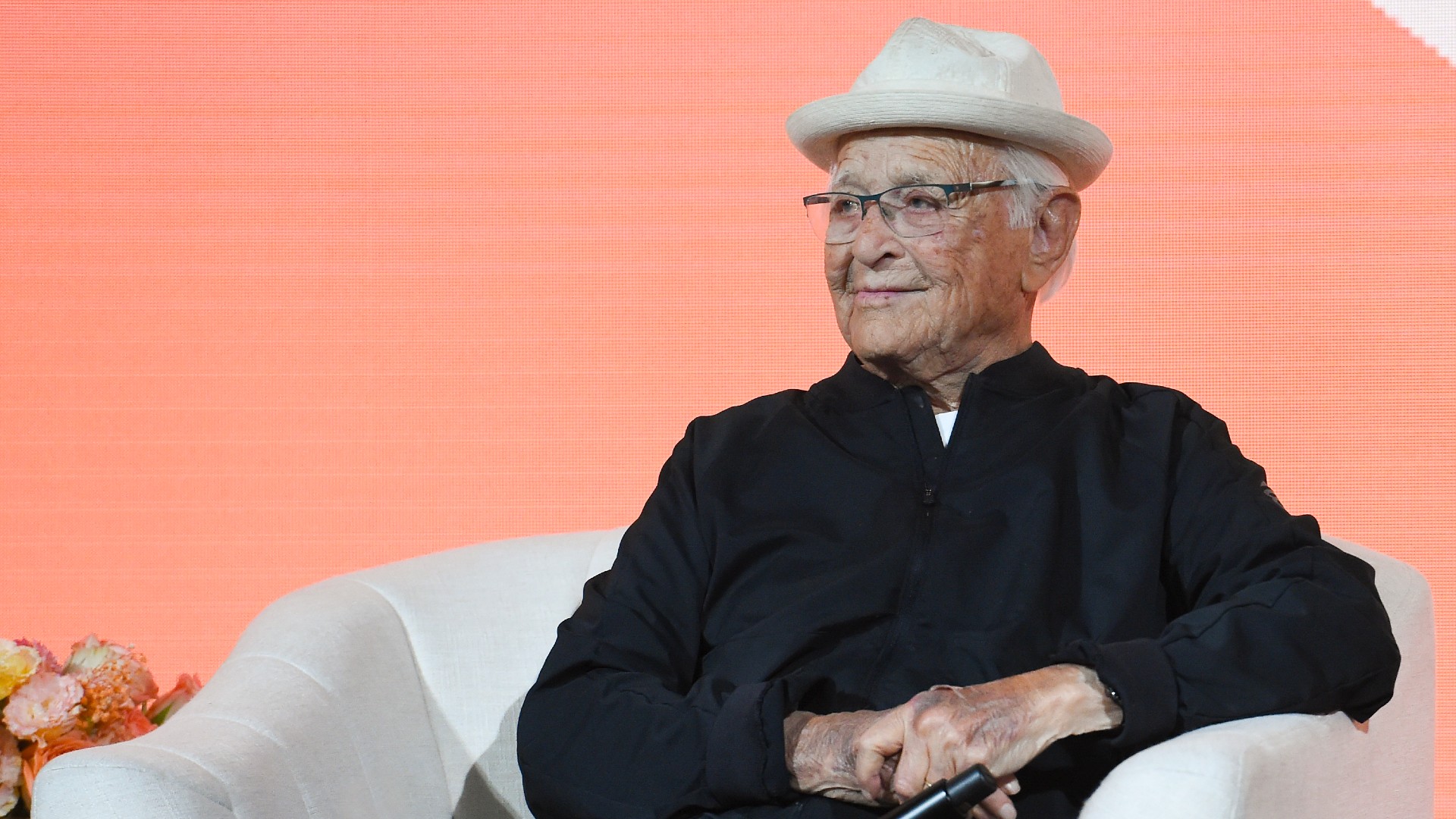All in the family: honoring Norman Lear, the godfather of the American sitcom
Lear revolutionized television and brought us memorable characters like Archie Bunker and George Jefferson


A free daily email with the biggest news stories of the day – and the best features from TheWeek.com
You are now subscribed
Your newsletter sign-up was successful
Norman Lear, the famed television writer and producer known for introducing political and social commentary into situation comedy, died Tuesday at his home in Los Angeles. He was 101. Lara Bergthold, a family spokesperson, confirmed his death.
Lear will be remembered for transforming "the bland porridge of situation comedy into a zesty stew of sociopolitical strife and brutally funny speech" and for giving the world "such embattled comic archetypes as Archie Bunker, Fred Sanford, Maude Findlay and George Jefferson" The Washington Post mused. His entertainment career spanned decades, and he later found prominence as a vocal liberal political activist. However, he established himself as a legend in the 1970s, when his shows transformed television into "a fractious national town meeting," the Post added, "and showcased the American family in all its hopes and dysfunctions."
While his ideas were initially met with "closed doors and misunderstanding," Lear "stuck to his conviction that the 'foolishness of the human condition' made great television, and eventually he was heard." his family said in a statement.
The Week
Escape your echo chamber. Get the facts behind the news, plus analysis from multiple perspectives.

Sign up for The Week's Free Newsletters
From our morning news briefing to a weekly Good News Newsletter, get the best of The Week delivered directly to your inbox.
From our morning news briefing to a weekly Good News Newsletter, get the best of The Week delivered directly to your inbox.
Bringing an 'adult sensibilty' to sitcoms
Lear was born in New Haven, Connecticut, on July 27, 1922, to Jeanette and Herman Lear, the latter whom Lear described as a "ne'er-do-well salesman," per the Post. After serving in the Army Air Forces during World War II, he moved to Los Angeles and worked as a door-to-door furniture salesman and photographer. He started writing comedy skits with a friend to make some extra money.
He built his reputation as a top comedy writer, eventually earning an Oscar nomination for his screenplay for "Divorce American Style" in 1968, before shaking up the sitcom world. In mid to late 1960s television, "the biggest problem any family faced was 'Mother dented the car, and how do you keep Dad from finding out'; 'the boss is coming to dinner, and the roast's ruined'" Lear said in a 2012 New York Times interview. "The message that was sending out was that we didn't have any problems." With his shows, Lear aimed to send messages that were "far more in tune with what was actually happening in those turbulent times," The New York Times noted.
Themes that weren't typically featured in commercial television at the time, such as racial prejudice, divorce, sexual assault, social mobility, and Black inner-city struggle, "were suddenly brought to compelling life through Mr. Lear's juggernaut of hits," the Post noted. He dominated screens in the 70s and 80s with hits that include "All in the Family," "Sanford and Son," "Maude," "Good Times," "The Jeffersons," and "One Day at a Time." His shows were "master classes in broad comedy," and their success was "undeniably due in large measure to the actors, who brought shadings of empathy to troubled, worried and often deeply flawed characters," the Post added.
The "adult sensibility" he brought to television found a place in the 1990s in cable dramas. "You can trace the impact of his shows in 'The Sopranos,' 'The Shield,' 'The Wire,' wherever you have complex characters of questionable morality," Ron Simon, a Paley Center for Media curator, told the Post. "Nothing was ever neatly wrapped up in Lear's world."
A free daily email with the biggest news stories of the day – and the best features from TheWeek.com
A voice for liberal activism
Lear was also one of Hollywood's most vocal liberal political activists and a generous philanthropist. In 1981, he founded People For the American Way, an advocacy group to preserve the separation of church and state. His outspoken liberal views "made him a target of those on the political right," per CNN. President Richard Nixon included Lear on his "enemies list," he was deemed the "No. 1 enemy of the American family" by Jerry Falwell, founder of the Moral Majority.
In more recent years, he turned his attention to protecting voting rights. He founded Declare Yourself, a nonprofit organization aimed at encouraging young people to register to vote, in 2003. To mark his 100th birthday, the Times published a guest essay by Lear where he reflected on the state of the country. "To be honest, I'm a bit worried that I may be in better shape than our democracy is," he observed. Still, he remained optimistic, calling for Americans to "bring all the grit and openheartedness and creative spirit we can muster" to come together and build a shared future.
Theara Coleman has worked as a staff writer at The Week since September 2022. She frequently writes about technology, education, literature and general news. She was previously a contributing writer and assistant editor at Honeysuckle Magazine, where she covered racial politics and cannabis industry news.
-
 What to know before filing your own taxes for the first time
What to know before filing your own taxes for the first timethe explainer Tackle this financial milestone with confidence
-
 The biggest box office flops of the 21st century
The biggest box office flops of the 21st centuryin depth Unnecessary remakes and turgid, expensive CGI-fests highlight this list of these most notorious box-office losers
-
 The 10 most infamous abductions in modern history
The 10 most infamous abductions in modern historyin depth The taking of Savannah Guthrie’s mother, Nancy, is the latest in a long string of high-profile kidnappings
-
 February TV brings the debut of an adult animated series, the latest batch of ‘Bridgerton’ and the return of an aughts sitcom
February TV brings the debut of an adult animated series, the latest batch of ‘Bridgerton’ and the return of an aughts sitcomthe week recommends An animated lawyers show, a post-apocalyptic family reunion and a revival of a hospital comedy classic
-
 Quiet divorce is sneaking up on older couples
Quiet divorce is sneaking up on older couplesThe explainer Checking out; not blowing up
-
 Heated Rivalry, Bridgerton and why sex still sells on TV
Heated Rivalry, Bridgerton and why sex still sells on TVTalking Point Gen Z – often stereotyped as prudish and puritanical – are attracted to authenticity
-
 Admin night: the TikTok trend turning paperwork into a party
Admin night: the TikTok trend turning paperwork into a partyThe Explainer Grab your friends and make a night of tackling the most boring tasks
-
 The 8 best hospital dramas of all time
The 8 best hospital dramas of all timethe week recommends From wartime period pieces to of-the-moment procedurals, audiences never tire of watching doctors and nurses do their lifesaving thing
-
 Scoundrels, spies and squires in January TV
Scoundrels, spies and squires in January TVthe week recommends This month’s new releases include ‘The Pitt,’ ‘Industry,’ ‘Ponies’ and ‘A Knight of the Seven Kingdoms’
-
 Golden Globes affirm ‘One Battle,’ boost ‘Hamnet’
Golden Globes affirm ‘One Battle,’ boost ‘Hamnet’Speed Read Comedian Nikki Glaser hosted the ceremony
-
 More than a zipper: Young Black men embrace the ‘quarter-zip movement’
More than a zipper: Young Black men embrace the ‘quarter-zip movement’The Explainer More than a zipper: Young Black men embrace the ‘quarter-zip movement‘
